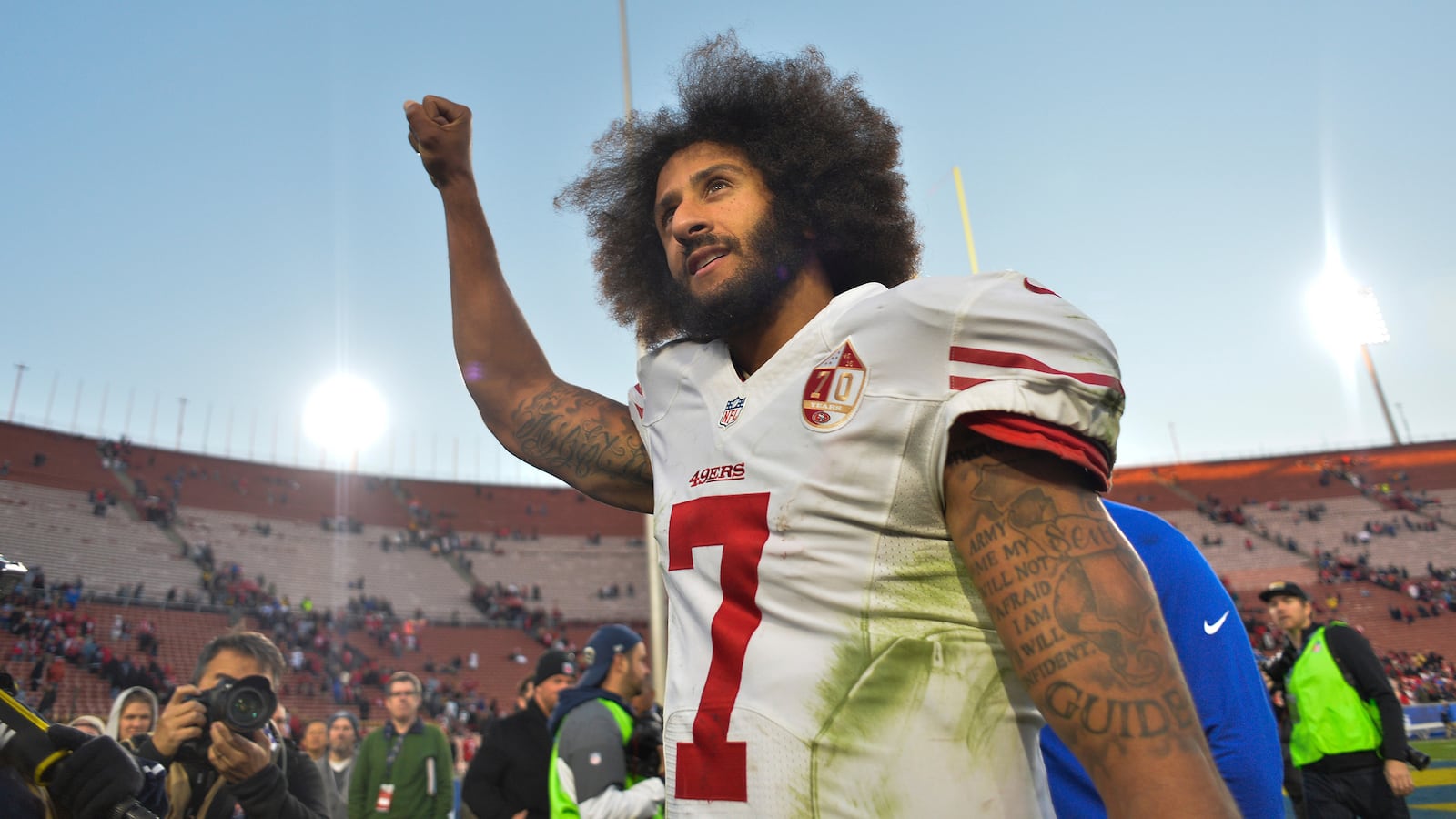A recent survey by Northwestern University’s Center for the Study of Diversity and Democracy has found that a strong plurality of African Americans would like former San Francisco 49ers quarterback Colin Kaepernick to get a new job. No, not as an NFL quarterback at a new team. As the head of Black Lives Matter.
According to the survey, 27 percent of respondents selected Kaepernick to lead the movement, with BLM co-founder Alicia Garza coming in a distant second with 10 percent. Opal Tometi and Patrisse Cullors—the other co-founders of BLM—received 7 and 4 percent respectively.
I say why not? He’s well-known, he has a following (and huge Twitter following, nearly 1.5 million), and even though a lot of white people hate him now, black people like or maybe love him. He’d command an instant platform none of the others could.
But his popularity shouldn’t equate to a coronation. If Kaepernick were to take on a bigger role in the BLM movement he’d need to articulate a vision and strategy to propel the movement forward during the Trump presidency. And he should start by atoning for a very grave error that both he and BLM made in 2016.
Kaepernick’s “Take a Knee” protest has continued to grow in significance as Donald Trump has remained fixated on the issue. And Kaepernick’s looming legal battle with the NFL over alleged collusion to keep him out of the league will further ensure that he remains in the public eye for the foreseeable future.
That’s all fine, but if he is to lead a movement, I want to see a vision or strategy about how he can deliver tangible results. According to survey respondents, they had similar concerns about the current state of BLM.
Across the board respondents had a positive perception of BLM. Fully 29 percent described the movement as “extremely effective,” 24 percent said “very effective,” and 29 percent said “moderately effective.” Yet when they were asked about BLM activities at the local level or their participation in BLM events, the responses were far less favorable. Of respondents, 44 percent said that BLM was “not active at all” in their communities.
Today, BLM finds itself at a crossroads. Supporters of the movement generally have a positive perception of it, yet they also yearn for a significant change in leadership and have grown weary of its decentralized structure. However, BLM’s problems won’t merely be solved by an organizational restructuring.
Following Donald Trump’s victory, BLM has less wind behind its sails, and its reliance on activism and protests to change America proved ineffective. The movement needs to find a new purpose or tactic for expressing its beliefs. Yes, activism and protests should continue, but as Trump’s presidency reminds all of us of the dire consequences elections can bring, BLM should look more to the ballot box to create the change they desire.
Personally, I’d like to see a massive get-out-the-vote initiative by the wider BLM community. Kaepernick’s national profile and the synergy between black athletes across all sports could provide the perfect platform for a new “Black Votes Matter” movement. Black athletes have massive social media followings and are given countless opportunities on camera to make their voices heard. They also constantly travel across the country, engage with fans, and already have organized networks of supporters. Kaepernick has the opportunity to tap into and galvanize this powerful community like no other American ever has.
I’d love to see how Trump and the GOP try to spin peaceful protests and voter registration drives by black athletes as “unpatriotic” or “disrespecting the flag.”
Unfortunately, judging by the actions of Kaepernick and BLM, a national Black Votes Matter movement seems incredibly unlikely. BLM and get-out-the-vote initiatives have always had a fraught relationship. During 2016, BLM opted to remain apolitical and not endorse any candidate. Some BLM activists even encouraged abstaining from voting during arguably the most decisive election in American history.
Likewise, Kaepernick did not vote in 2016, stating that “it really didn’t matter” who won, and that he “didn’t pay too close of attention” to the election. He famously justified his decision to self-disenfranchise by saying, “To me, the oppressor isn’t going to allow you to vote your way out of your oppression.”
By abstaining or remaining disengaged from the voting process in 2016, Kaepernick, BLM and other activists chose to apply a defeatist attitude to democracy and voting rights. They chose to disarm themselves of one of the most powerful tools of black liberation, and while we can’t say that this decision led to Trump’s victory, it certainly did not increase the influence of BLM and the wider fight against police brutality and systemic racism.
African Americans distancing themselves from the act of voting, either due to the perceived inadequacy of a particular candidate or the inescapable weight of America’s systemic racism, represents a forgoing of our hard-earned liberties, and makes us more likely to have these freedoms stripped away.
If Kaepernick, or someone else, chooses to lead a national black empowerment, racial equity movement then a renewed emphasis on voting and a 2016 mea culpa should be front and center. The strength and leadership to admit a mistake and chart an inclusive, racial justice future are much needed in America today.






